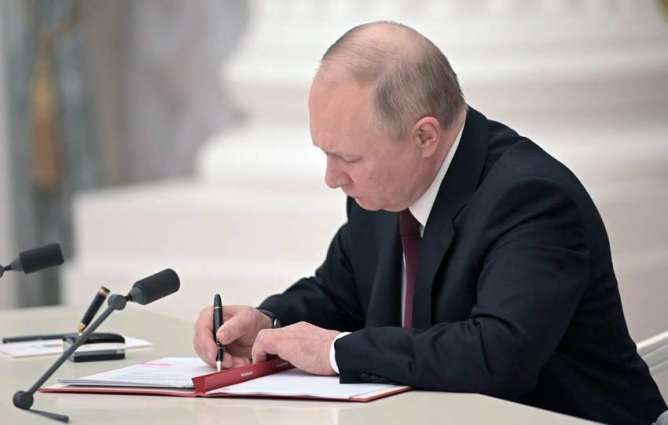Russia's recent decision to recognize the self-proclaimed Luhansk and Donetsk people's republics (LPR and DPR) after eight years of armed conflict in Ukraine's Donbas region is likely due to President Vladimir Putin sensing a lack of alternatives, experts have told Sputnik
MOSCOW (Pakistan Point News / Sputnik - 22nd February, 2022) Russia's recent decision to recognize the self-proclaimed Luhansk and Donetsk people's republics (LPR and DPR) after eight years of armed conflict in Ukraine's Donbas region is likely due to President Vladimir Putin sensing a lack of alternatives, experts have told Sputnik.
Since April 2014, the Ukrainian government has been conducting a military operation against the self-declared republics. Prospects for peace have been discussed in various formats with little to no result. On Monday, members of the Russian Security Council expressed their shared understanding that Moscow had no other options but to recognize the breakaway republics' independence. Putin signed decrees recognizing the independence of the two regions later that day.
"My sense is that he (Putin) was waiting and attempting to gain influence through 'lower cost' means, either through the establishment of a pro-Russian regime in Kiev, or credible commitments by NATO and the EU that they would not offer further support to Ukraine (such as the ceasing of military aid). With neither 'lower cost' option occurring, Putin decided to escalate the situation. He likely feels that he doesn't have any other option," Paul Poast, an associate professor at the University of Chicago, said.
Paul Robinson, a professor of public and international affairs at the University of Ottawa, thinks that the move indicates that Moscow no longer believes that Kiev will ever fulfill the provisions listed in the Minsk agreements, adopted by the Trilateral Contact Group to stop the war in Donbas and provide a long-term political resolution of the longstanding conflict.
"In my opinion, Moscow's hope these past eight years has been that the war in Donbas could be settled on the basis of the Minsk agreements. The recognition of the DPR/LPR reflects a belief that Ukraine will never follow through with the promises made in Minsk to give special status, i.e. autonomy, to Donbas," Robinson said.
According to Cato Institute Senior Fellow Ted Galen Carpenter, this move by the Kremlin is a significant escalation of the regional dispute.
"Putin has drawn a line in the sand, and NATO had better understand that Moscow will never allow Ukraine to become a Western political and military client. If there was any doubt before about Russia's determination to prevent such an outcome, there should be none any longer," Carpenter explained.
Meanwhile, Riccardo Alcaro, the research coordinator and head of the Global Actors Program of the Istituto Affari Internazionali in Rome, thinks that the decision has rendered a diplomatic solution to the crisis over Ukraine impossible.
"This is a tragedy, because a war may still break out and because the EU and the US will be forced to respond with sanctions and possibly military deployments to NATO's member states in Central-Eastern Europe. We have all lost, and we are all heading towards a period of structural conflict with Russia," Alcaro stated.




